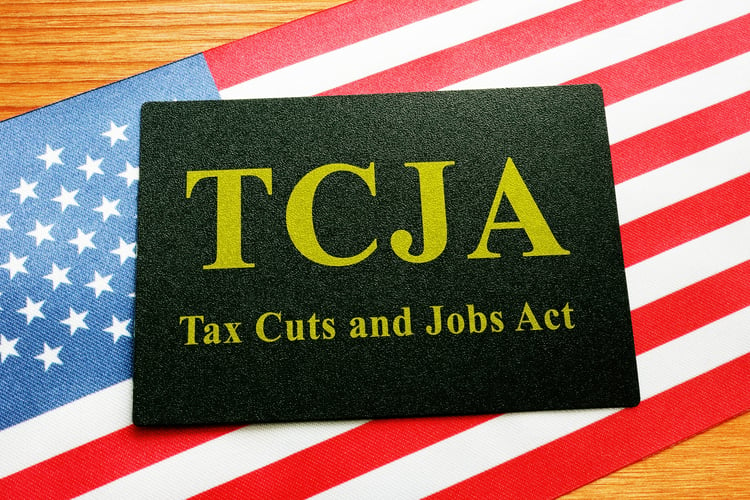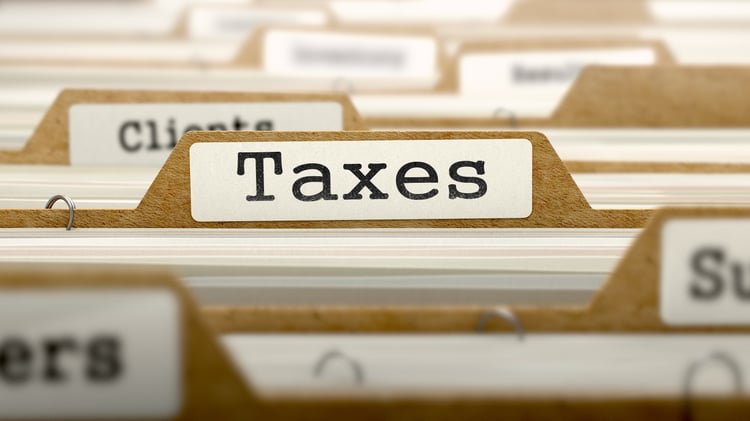As a self storage facility owner, the Tax Cuts and Jobs Act (TCJA) — passed by Congress and signed into law in 2017 — could have far-reaching implications for your business. It is important to understand how the legislation can affect you, as well as any opportunities it provides to take advantage of potential tax savings or other benefits.
In this blog post, we’ll explain — alongside Bruce Heverly, the Cost Segregation Services Inc. (CSSI) National Storelocal Representative, who joined us for a recent Storelocal Member Call — how the complicated provisions of the TCJA may impact your own finances. Whether you are a brand new storage facility owner or have owned your facility for years, the TCJA can benefit you right away.
Overview of the Tax Cuts & Jobs Act

The Tax Cuts and Jobs Act is a complex piece of legislation that has far-reaching implications for individuals and businesses alike. At its core, the act represents an attempt by Congress to reform the tax code and stimulate economic growth by reducing the tax burden on many Americans.
Some of the key changes implemented by the act include a lower corporate tax rate, a simplified tax structure for individuals, and increased deductions for many taxpayers.
"It's all about offsetting gains and reducing your taxes…by setting up an LLC, which most of you have, all of these losses go against your personal income,” Heverly explained. Heverly also explained that an engineer should perform a cost segregation study, not an accountant, based on rulings from the IRS.
While the full impact of the legislation remains to be seen, there can be no doubt that the Tax Cuts and Jobs Act represents a significant shift in the way that many Americans will approach their finances for years to come. As such, it is essential that individuals and businesses alike stay informed about the many nuances and implications of this important piece of legislation.
Impact on Self Storage Facility Owners
With many people working from home and needing more storage space in today’s economy, one would think that self storage would be in high demand.
However, with millions of Americans out of work and inflation on the rise, many are struggling to pay their bills — including their self storage rental payments. This has led to an increase in delinquent accounts, fewer move-ins, more move-outs, reduced rental rates. This changes the financial picture for facility owners and may cause some to struggle financially.
Despite the challenges, self storage facility owners are finding ways to adapt and thrive in this new environment. For example, some have implemented contactless rentals and payments, making it easier and safer for customers to utilize their services. As the pandemic continues to shape our world, it will be interesting to see how self storage facility owners continue to adjust and overcome these unique challenges. Thankfully, the TCJA can help.
"It enables you to free up a lot of cash that's been sitting with the IRS or is about to sit with the IRS and put that cash flow back to work," Heverly said. "[We’re] able to acquire a third more of the facilities than we were before because of this tax strategy, and taking that money and plowing it back into your operations or acquisitions. So the people that really benefit from this are folks that have recently purchased buildings or have recently built them, and people who've owned buildings for several years." —Bruce Heverly, CSSI.

New regulations also make it easier for self storage owners to put depreciation into motion. Heverly shared a hypothetical scenario about what happens when rebuilding a facility after a natural disaster:
"When I repair that building, put a new roof, and put in my new units inside, I have to write down my old units. The tax law used to force you to keep carrying that stuff for 39 years, depreciating it slowly over time.
But the TCJA regulations now allow you to fully write down that loss, put your new structure back in service, and then you can cost seg that new structure.
The TCJA enables you to identify those components that you can take bonus depreciation [on] and puts that into motion. And then the CARES Act that was passed while we were going through COVID allows you to take your qualified improvement property and write that off all at once instead of over a 15-year period of time."
Benefits of Lower Corporate Tax Rate
Lower corporate tax rates can bring numerous benefits to businesses and the economy as a whole. With a lowered tax burden, companies have more funds available to invest in their operations or expand their workforce. This can result in job creation and economic growth, ultimately benefiting the entire nation.
This also helps with your cash flow at the end of the day. With the CARES Act and TCJA combined, you can generally expect a decrease in federal taxes plus an increase in cash flow to invest in more properties or to improve your existing storage facilities. You should also talk to your accountant to ensure that you didn't miss out on any possible cuts and to see if you are eligible for a refund.

Expansion Opportunities with Cost Savings
In today's competitive market, businesses are always on the lookout for opportunities to grow and expand their operations. However, with growth comes the challenge of increasing costs, which can make expansion a daunting prospect. That's why it's crucial to focus on identifying cost-saving measures that can help fuel expansion efforts.
"Using this strategy, for every three buildings that you buy, the risk capital on the third one will get paid for by the reduction in your income tax. That is incredibly powerful. That's the way that we've been using this to grow our portfolios a third faster than before. [There is an] impact on interior work; [if] you decide that you're going to convert to climate control or other types of things that you may have done that were previously 15-year qualified improvement, you get bonus depreciation on that. So you're able to write 15 years' worth of losses all at once." —Bruce Heverly, CSSI
By exploring avenues like process optimization and leveraging economies of scale, facilities can streamline their operations and save precious resources that can be directed toward growth initiatives.
With the right approach, expansion opportunities don't have to come at the expense of the bottom line. And by prioritizing cost savings, businesses can set themselves up for sustained growth and success.
Benefits of Increased Deduction and Depreciation Allowances
As a business owner, you are constantly looking for ways to maximize profits and minimize costs. One way to do so is by taking advantage of increased deduction and depreciation allowances offered by the government. These benefits allow you to write off more expenses and depreciate assets faster, ultimately reducing your taxable income and improving your bottom line. Not only will this save you money on your taxes, but it can also free up cash flow to invest back into your business.
"For 2023, it goes to 80% bonus depreciation, then 60%, then 40%, then 20%, and then it phases out unless Congress decides that they're going to extend," Heverly explained.
The increased deduction and depreciation allowances can also incentivize you to invest in new equipment and technology, helping you stay competitive in your industry. Don't miss out on these valuable tax benefits that can greatly benefit your facility’s financial health.

How to Maximize the Tax Benefits for Self Storage Businesses
As a self storage business owner, maximizing tax benefits should always be a top priority. One of the best ways to do so is by taking advantage of deductions such as depreciation, repairs, and maintenance. It's important to keep detailed records and stay up to date with current tax laws to ensure you're making the most out of your deductions.
Additionally, investing in energy-efficient upgrades to your facility can also lead to significant tax savings. By staying knowledgeable about tax benefits and diligently documenting expenses, self storage businesses can save themselves money and put those funds towards growing their portfolios.
Heverly said:
"It's all about cash flow. This is a methodology for the timing of your capital. Cost segregation is the process of analyzing and identifying the components of your buildings. It can tell you in a lot of cases whether it's a better idea to have a climate-controlled building or not… It results in lower income tax. It enables you to provide everything to the IRS that's necessary to make sure you have the building systems valuation that they require for your tax returns."
In a Nutshell
The Tax Cuts & Jobs Act offers a range of tax benefits for self storage facility owners. With lower corporate tax rates, increased deduction and depreciation allowances, and other cost savings opportunities, business owners achieve greater net incomes and benefit from financial relief.
The decrease in corporate tax rate equates to more cash flow for businesses and allows self storage facilities to re-invest into investments like acquisitions or expansions. Collateral cost savings allow commercial real estate owners to add new services offered to attract tenants.
By managing taxes efficiently with sound business practices combined with an understanding of how the Tax Cuts & Jobs Act affects them directly, self storage facility owners can maximize the potential benefits available.
Ultimately, it is important to consult with a CPA experienced in working with the self storage industry to ensure that every opportunity to benefit from this legislation is taken advantage of.
About Our Partner, CSSI
CSSI is the nation’s premier engineering-based cost consulting firm focusing on the tax law surrounding commercial buildings including the 2014 Repair Regulations, 2017 Tax reform, and Cost Segregation. With over 40,000 studies completed, CSSI has never triggered an audit nor had a study overturned. CSSI's roots of involvement in cost segregation began in 1997 as an advisor to the original court case in 1997 between HCA and the IRS.
How Storelocal Can Help
At Storelocal, our partners are here to help. We partner with CSSI, which can provide insight into how to take full advantage of the Tax Cuts & Jobs Act and offer advice tailored to your unique financial situation. Contact us today to learn more.
